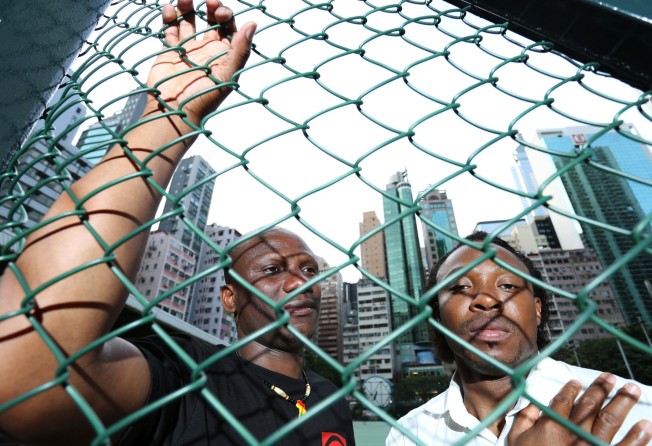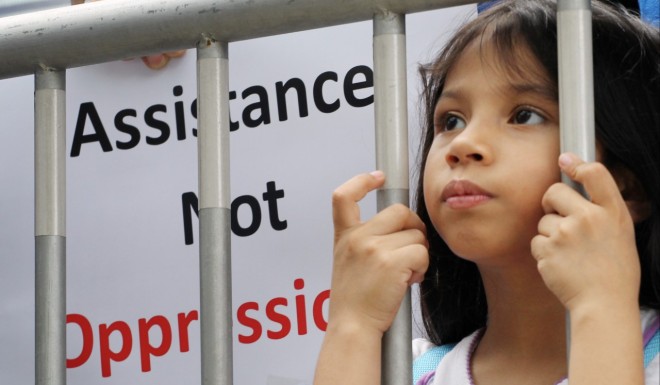Hong Kong, Once a Haven for Asylum, Closing Doors to Refugees
The city may abandon the UN Convention Against Torture and a lawmaker has proposed detention camps.

“David” is a 35-year-old asylum seeker from East Africa. He fled to Hong Kong two years ago and since then he's been sharing a subdivided flat in Jordan with a roommate. Rent costs $4,800 a month. “I have to beg to pay rent,” the former operations manager says, who can’t use his real name in fear of having his claim for asylum rejected.
David is one of the city’s some 11,000 non-refoulement claimants—meaning he has a legitimate fear of being tortured or killed if he returns home. For the last two years, he's been waiting to be put through the government’s unified screening mechanism (USM) for asylum seekers. The USM promises a six-month wait from the time a claim is lodged to an arrival at an initial decision, but Labour Party vice-chairman Fernando Cheung Chiu-hung, who is an advocate for asylum seekers, says that the wait is often much longer. “Some wait more than five years. I know of a man who waited 12 years. They just want their lives back,” he says.
A group of more than 170 individuals and organizations—representatives met the press on Monday at the Legislative Council—says for people like David, their plight in Hong Kong will only get more challenging. Recently there's been a wave of media reports and calls for stricter control to tackle a rise in the number of claimants and alleged abuses of the USM. In the past month alone, there have been more than 400 reports in Hong Kong media on so-called "fake asylum seekers" and illegal immigrants, blaming them for everything from petty crime to drug smuggling.
“Suddenly, [asylum seekers] started to be referred to as ‘illegal immigrants.’" says Victoria Wisniewski Otero, a representative of the Refugee Concern Network and advocacy and campaigns manager at the Justice Centre Hong Kong. “This is an inaccurate term and there are differences between migrants and refugees.”
In January, the government vowed to “intercept illegal immigrants at source and to expedite the screening process to remove unsubstantiated claimants to their country of origin as soon as possible” in response to a growing number of claimants and alleged abuses of the system.
Last month, Hong Kong and mainland authorities launched a large-scale crackdown arresting some 3,000 South and Southeast Asians—most of them from Vietnam and Pakistan. This hints at a tougher road ahead for asylum seekers—according to immigration records, nearly half of all asylum claimants are smuggled into Hong Kong. Lax visa restrictions in China mean it’s relatively easy for asylum seekers to enter Hong Kong via the mainland.
Following the high-profile crackdown, the arrests of 17 illegal workers soon afterwards—one of whom was a Vietnamese asylum seeker—also made headlines across the city. But official figures show that only around 12 percent of torture claimants were arrested or detained in 2015 for working illegally and other criminal offenses.
Lawmaker Cheung suggests that ethnic minorities have not been spared from what he calls a “hate campaign,” either. “Media outlets have also been highlighting crimes committed by ethnic minorities,” he says. “This promotes divisiveness and fear that won’t go away for years.”
The group says policymakers have jumped on the scare-mongering bandwagon. Pro-establishment lawmaker Priscilla Leung proposed last month to build detention centers and put asylum seekers there. Closed detention centers—as opposed to jails—contravene Article 39 of the Basic Law.

It could also take a toll on the city’s taxpayers: Hong Kong-based human rights expert Earl Deng says Australia spends $7 billion on offshore detention facilities every year for 1,500 applicants. “Imagine how much that would cost for Hong Kong,” he says.
Chief Executive Leung Chun-ying said earlier this year Hong Kong would withdraw from the UN Convention Against Torture “if needed," as a response to the city's growing number of torture claimants. In Monday's joint statement, lawmakers and advocates criticized this “embarrassing step backwards,” saying it would “roll back the rights and protections of every resident of Hong Kong against being tortured, or exposed to other abuse.”
These advocates suggest that authorities should instead focus on reducing delays and addressing the inefficiencies in the USM. A Legislative Council publication shows that the USM, which was implemented two years ago, grants protection to less than one percent of asylum seekers. The Refugee Concern Network says for the rest of the developed world, that number is dramatically higher, at 30 to 40 percent.
Law Yuk-kai, director of the Human Rights Monitor, suggests that the government should provide better training for immigration officers, create databases containing information on the claimants’ countries and individual cases, and also hire more interpreters.
Cheung says that it wouldn’t hurt to provide “restricted employment” to asylum seekers, either; that is, to allow asylum seekers to work in certain jobs, particularly those where the city is short on manpower.
Non-refoulement claimants are placed under the care of the International Social Services Hong Kong, which provides for each asylum seeker around $3,000 worth of monthly assistance—$1,500 for housing, $1,200 in food coupons, and $300 for household utilities.